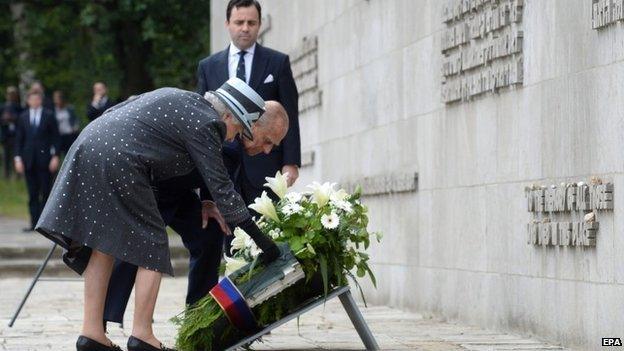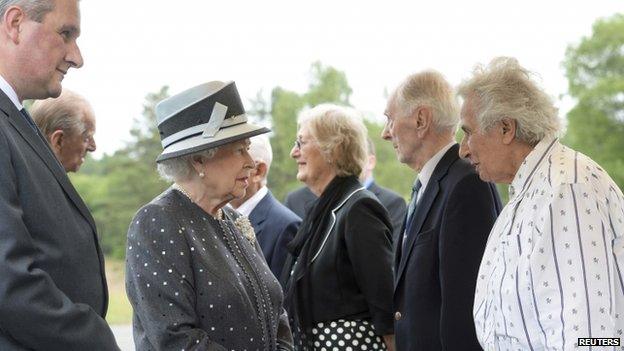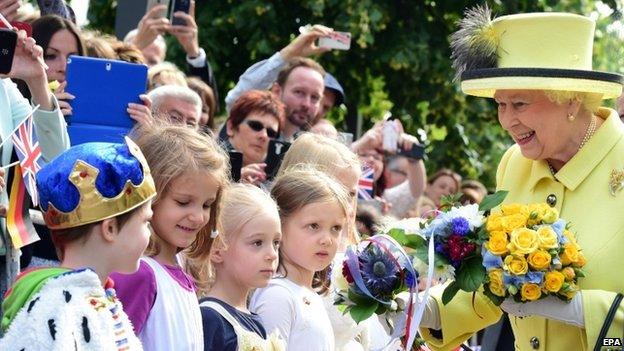Sombre end to Queen's German visit
- Published

The Queen laid a wreath at the memorial at the former Nazi concentration camp in Bergen-Belsen
This was a Queen who lived through World War Two as a teenager, coming to learn, first-hand, about some of the very worst excesses of a former enemy.
With Prince Philip she passed the mounds that mark where the mass graves are.
There are 13 mounds. They contain the remains of more than 20,000 people.
There was no pomp or ceremony - just a couple from the wartime generation taking their time to reflect and to pay their respects.
The 89-year-old Queen and her husband, who's 94, walked quite a distance through what remains of the former concentration camp at Bergen-Belsen, met a few of those who lived and three of the British soldiers who set them free.
The survivors and the liberators told them about their shared experience of horror.

The Queen spoke to survivors of the Holocaust during a trip to Bergen-Belsen
At the end the Queen said to one person, "it's difficult to imagine, isn't it?"
This was a sombre end to a four-day visit which will be viewed as a success by the German authorities and by Buckingham Palace - despite, on the first day, a self-inflicted distraction caused by questions about how Scotland would fund the monarchy in the future.
The crowds have been sizeable, though not vast.
In 1965, for the first of the Queen's five state visits, 100,000 people were on the streets on one occasion to see her.
Five decades and four visits later, the crowds have thinned but the fascination is still there.
This is a woman, British diplomats say, who appeals to the Germans.
She stands for something they appreciate: continuity, stability and a sense of duty.
Before the trip, the details of the advice given to guests who would encounter the Queen were devoured by the newspapers.
These included the instruction to not take selfies; to refer to her as Your Majesty; and to consider lilac as a safe colour to wear.

The Queen was greeted by crowds when she visited Berlin
Once here, plenty of column inches and several broadcast hours have been devoted to reflecting all aspects of the Queen's carefully-paced journey from Berlin to Frankfurt to Bergen-Belsen.
Next to a large picture of the Queen, on its front page, the Bild newspaper printed the headline, "We Love You Ma'am".
This in a country which saw off its hereditary monarch in 1918.
From the perspective of a British prime minister, the Queen can be a useful diplomatic tool - not that they'd ever express it like that, when talking to her at their weekly audiences.
So, at a time when David Cameron is seeking to renegotiate the terms of the UK's EU membership, the Queen, at a state banquet, spoke about Europe.
She didn't endorse her prime minister's approach; rather her speech focused on the benefits of Europe and the dangers of division.
But its unashamedly pro-European tone will be helpful to Mr Cameron if he does choose to endorse our continuing membership of the EU when the referendum is held.
For now, though, the Queen has done her bit to strengthen the Anglo-German relationship during a period when Mr Cameron needs his allies.
At 89, the Queen will next travel abroad to Malta in November for the Commonwealth summit.
Prince Philip, who'll be at her side, will be 94.
Will Germany prove to be the last non-Commonwealth state visit this monarch makes?
A spokesman for the Queen said the rumours that there'd be no more state visits were "greatly exaggerated".